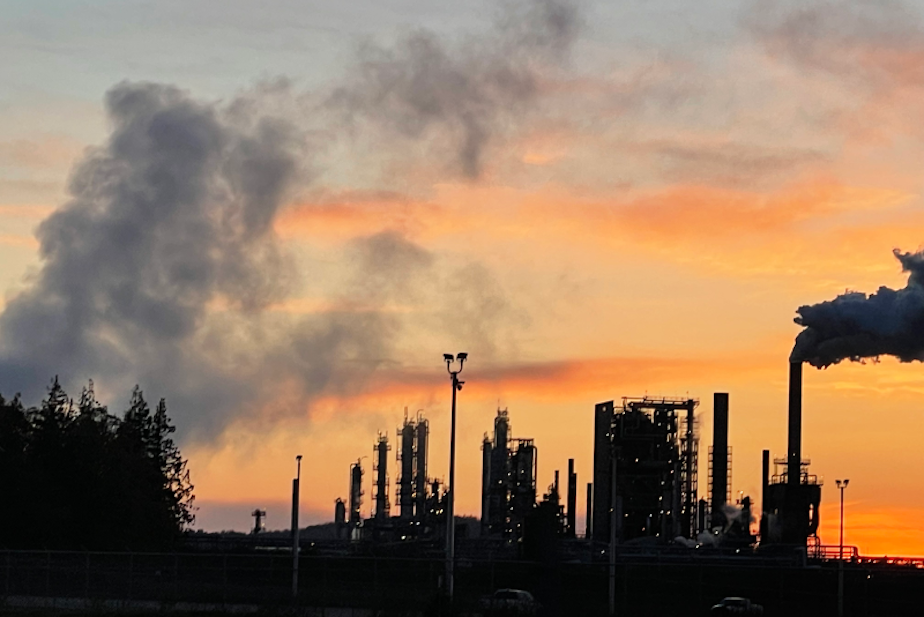Despite rise in emissions, Gov. Inslee says Washington can still meet carbon pollution goals

Washington state is not meeting its own greenhouse gas reduction goals.
But in an interview, Gov. Jay Inslee said he thinks the state can still meet its reduction goals by 2050. Still, in recent years, emissions have increased in Washington.
"I think it is very likely Washington state will meet those targets," Inslee told Austin Jenkins on TVW.
"We're on track so far, but we need to do some additional things," he said.
RELATED: Costs, and potential benefits, of reducing emissions in Washington's agricultural industry
Sponsored
The state's goal is to reduce emissions by 95% by 2050, over levels recorded in 1990. The state's emissions are currently 9% higher than they were in 1990.
Susan Woodward, spokesperson for the state's Ecology Department, says there are a few factors to blame for the rise in emissions.
"Since 2012, emissions have been slowly increasing and transportation, building sector emissions are the biggest contributors to those small increases that have been happening," Woodward said.
Inslee says if the state's low-carbon fuel standards, and the move to 100% clean energy, are carried out, then emissions will start to come down.
"But there's more things we need to do," Inslee said. "In my budget, I want to help people to swap out to a heat pump, off of natural gas; we wanna help you get access to a charging station when you use an electric car, so we're making massive investments in getting charging infrastructure."
Inslee said technological advancements will also help the state meet its carbon pollution goals, adding that "we have almost always undervalued the rate of innovation which we humans, and Washingtonians are capable of." He further argues that the pace would not have been so slow if he had a Democratic Legislature over the past decade.
"We have just now passed these bills, two years ago, they are just now coming into implementation," Inslee said. "So we are not on track on the carbon reduction, but we are on track for what we need to get there ... I think it is very likely Washington state will meet those targets."
Sponsored
The effort to cut down on greenhouse gas emissions is written into Washington's state code. More recently, lawmakers passed the Climate Commitment Act, which has set up programs like cap-and-invest. The first auction for the cap-and-invest program will be in February 2023. Companies' emissions will be capped, but they can buy allowances for additional carbon emissions. Those allowances can be traded like bonds. The emissions caps are scheduled to decrease over time.
RELATED: King County aims to slash carbon emissions in half by 2030, including aviation
The state also has a goal to nix all sales of gas-powered cars by 2035. The state's Clean Energy Transformation Act, passed in 2019, targets the energy utility sector with requirements to cut down on emissions, and to modernize the grid.
Another effort is Washington's Clean Fuel Standard. This law requires "fuel suppliers to gradually reduce the carbon intensity of transportation fuels to 20% below 2017 levels by 2038," according to the state's Department of Ecology. State officials say this can be accomplished by improving fuel efficiency, blending with low-carbon biofuels, and purchasing credits.
RELATED: New airport would put Washington's climate goals out of reach, critics argue
Sponsored
"We intend to be a green energy hub," Inslee added, throwing the potential for hydrogen fuel into the mix.
Washington state and Oregon are competing with other states for federal funds to develop a green hydrogen hub for the region. The idea is to use electrolysis to remove hydrogen from water and use that as fuel. The governor says he has already signed an MOU with the ambassador for South Korea to pursue a hydrogen fuel trade.
"We are a perfect place for this ... We want to start a green Pacific corridor for hydrogen," he said.
Inslee spoke to Austin Jenkins on TVW's "Inside Olympia."





